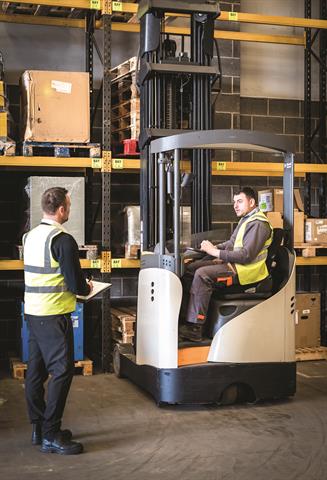 Stuart Taylor |
Stuart Taylor is Managing Director of Mentor FLT Training Limited, the UK's leading provider of training and associated services for all types of materials handling equipment and workplace transport.
With every business facing its own challenges during the pandemic - from unprecedented peaks and emergency temp workers, to periods of inactivity and skeleton teams - day-to-day operations may seem quite different to the pre-lockdown norm. For this reason, it's as important as ever that safety awareness stays front of mind amongst your team, and forklift refresher training for your operators remains a must.
Maintain standardsIt's vital that whatever else changes, basic forklift safety standards continue to be met, because the consequences of unsafe use remain serious and life-changing. Even something as simple as a different colleague sharing the operating area can increase risk if habitual shortcuts are taken in favour of fundamental forklift safety basics.
Regular refresher training is key to ensuring that operators maintain good driving habits, learn new skills (where appropriate), and reassess their abilities. It helps to ward off bad habits and complacent attitudes to safety which can soon spread throughout teams and cause costly accidents and injuries.
In the UK, the HSE recommends that refresher training take place at regular intervals, for example, every three to five years. This is outlined in Approved Code of Practice (L117), which those with rider-operated lift trucks in the UK should abide by to ensure their operations remain safe and compliant.
 Training providers are able to provide refresher training, whilst still following social distancing and hygiene guidelines regarding COVID-19 |
The required frequency of refresher training will depend on a number of factors, including the operator's skills, the type of equipment used, and the nature of their tasks. The best way to determine this is by carrying out a risk assessment specific to your operation, and frequently reviewing it for relevance.
For some, refresher training was due in the lockdown period, during which the HSE granted extensions of three months (with the relevant justification). In that case, now will likely be the time to catch up and businesses must make sure rescheduling is not overlooked. If forklift operators have not used trucks for some time, or site layouts and practices have changed, then refresher training may also be necessary in these cases. It is possible that during an extended time away, operators could suffer from skill fade and need to reacquaint themselves with the equipment and their tasks before they start their first shift.
Booking trainingIn the UK, many training providers are able to provide refresher training, whilst still following social distancing and hygiene guidelines regarding COVID-19, with the Association of Industrial Truck Trainers releasing a method statement outlining measures for safe MHE training at this time. With this in mind, businesses now delaying refresher training without sufficient justification are putting themselves at risk, not only of accidents and injuries, but of HSE action should they fail to meet their responsibilities.
Employers may be tempted to make blanket changes to their refresher policies due to the disruptions of the pandemic, but this is not advisable, as it risks pushing back important training unnecessarily. Suitable refresher frequencies should not be altered without the proper justification, i.e. a risk assessment specific to the operation which is reviewed regularly for relevance.
And don't forget, there are times when refresher training can be required more urgently, should an operator develop unsafe working practices or have a near miss, for instance. Good supervision will help to highlight any additional training needs.
Indeed, at times like these when there are changes on site, close monitoring is key, and any operators coming back to work will need additional supervision to ensure they make a safe return to the working environment. Those who are due refresher training will also need to be monitored to ensure that they continue to work safely until training is delivered.
Ultimately, safe and efficient operations rely on the standards held by your operators. Supervision and training help ensure that these don't slip. So, whether you had to pause during the pandemic, or worked all the way through, check whether your operators need to refresh their skills to cope with the demands of these ever-changing times.